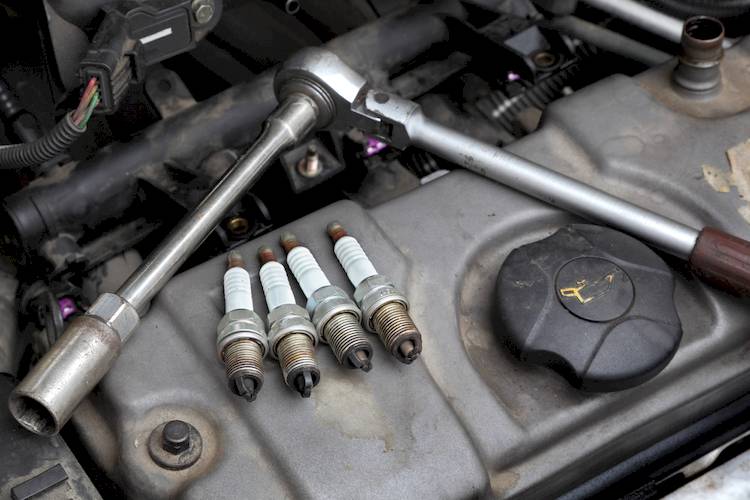

Without a spark, there would be no way for fuel to ignite in the combustion chamber. Spark plugs have been a critical component of the internal combustion engine for years. Spark plugs are designed to transmit an electrical signal sent from the ignition coil at a predetermined time to create a spark that ignites the air-fuel mixture inside the combustion chamber. Each vehicle requires a particular type of spark plug made from specific materials and with a designated spark plug gap set by a mechanic during installation. Good spark plugs will burn fuel efficiently, while bad or failing spark plugs can cause the motor not to start at all.
Spark plugs are similar to motor oil, fuel filters, and air filters in that they require routine service and maintenance to keep your engine running strong. Most vehicles sold in the United States require their spark plugs to be replaced every 30,000 to 50,000 miles. However, some newer cars, trucks, and SUVs have advanced ignition systems that ostensibly make spark plug replacement unnecessary. Regardless of any warranties or claims made by a vehicle manufacturer, there remain situations where a spark plug wears out or shows signs of failing.
Listed below are 6 common symptoms of worn-out spark plugs or spark plugs that have fouled and need to be replaced by an ASE certified mechanic as soon as possible.
1. Slow acceleration
The most common cause of poor acceleration in most vehicles is a problem in the ignition system. Today's modern engines have multiple sensors that tell the onboard computer and ignition system when to send electric pulses to fire the spark plug, so the issue may be with a faulty sensor. However, sometimes the issue is as simple as a worn-out spark plug. A spark plug is composed of materials that work together to produce a spark hot enough to ignite the air-fuel mixture. When those materials wear out, the effectiveness of the spark plug is reduced, which can significantly reduce the acceleration of the vehicle.
If you notice that your car is running sluggishly or does not accelerate as quickly as it used to, it may be attributed to a faulty spark plug that needs to be replaced. However, you should contact a mechanic to inspect this issue as it could be caused by multiple other factors including bad fuel filters, dirty or clogged fuel injector, or issues with oxygen sensors.
2. Poor Fuel Economy
A fully-functioning spark plug helps burn fuel efficiently in the combustion cycle. When this occurs, your car can achieve better-than-average fuel economy. When the plug is not working optimally, it is frequently because the gap between the spark plug electrodes is either too close or too far apart. In fact, many mechanics will take out spark plugs, examine them, and adjust the gap to factory settings as opposed to replacing the spark plug entirely. If your vehicle has an increase in fuel consumption, it very well could be attributed to a worn out spark plug.
3. Engine is Misfiring
If the engine misfires, it's typically due to an issue in the ignition system. In modern cars, it's usually due to a sensor malfunction. However, it may also be caused by a spark plug wire or the tip of the spark plug that connects to the wire being damaged. An engine misfire can be noticed by intermittent stumbling or sputtering sounds from the engine. If the engine is allowed to keep misfiring, exhaust emissions will increase, engine power will decrease, and fuel economy will drop.
4. Engine Surging or Hesitating
You may notice the engine hesitating while accelerating. In this case, the engine is not responding correctly to the driver. It may suddenly surge in power, then slow down. The engine is sucking in more air than it should be in its combustion process, causing the delay in power delivery. The combined hesitation and surging could indicate a spark plug problem.
5. Rough Idle
A bad spark plug may cause your engine to sound rough while idling. The vehicle-encompassing, jittery sound will also cause your vehicle to vibrate. It can indicate a spark plug problem in which a cylinder misfires only while idle.
6. Hard to Start
If you have trouble starting your vehicle, it could be a sign your spark plugs are worn. As noted above, the engine's ignition system is comprised of multiple individual components that must work cohesively in order to function properly. At the first sign of problems starting your car, truck or SUV, it's a good idea to contact a certified mechanic to take a look at the cause.
Regardless of what the issue might be, you might end up needing new spark plugs when yours eventually wear out. Being proactive about spark plug maintenance can extend the life of your engine by hundreds of thousands of miles.



